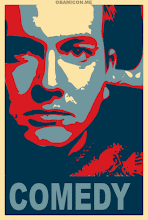
William Shakespeare: Masturbating? Quite possibly. Angry? Definitely.
Why is Shakespeare so pissed off? What has he got to complain about? His plays are performed more often than anybody else's, his (admittedly genius-level) skills as a playwright are constantly being exaggerated, and kids are forced to read his plays in school pretty much constantly from the seventh grade on. What's the problem?
The problem is that kids are forced to read his plays, at all. We teach Shakespeare, at least in this country, primarily as "dramatic literature". His plays are things to be read in book form, perhaps out loud if you're lucky, in an English class (or, god love 'em, a "Language Arts" class), taught by an English teacher, as fine examples of English literature.
At this point, I'd like to warn any English Teachers, Performance Studies Majors, and/or weak-constitutioned Dramaturgs that I'm going to officially let the cat out of the bag:
Shakespeare isn't literature.
"What can you mean?" they gasp. "His words are written! In English! In such a way as they can be read! That makes it literature! And thus part of our departmental budget!"
Here's the thing: his plays are most emphatically NOT written in English, or in any other language. His scripts are. And his scripts are but a means to an end. Scripts are technical tools used to make theatre. They are blueprints, not the buildings themselves.
Walking in to an English class and being handed a script to analyze (any script, really) is a lot like walking in to a class about how to sit in a chair and being handed a sheet of Ikea instructions.

The famous "Lost Page" from the First Folio. Note that the first four illustrations all picture men having sex with furniture, showing that Shakespeare's use of bawdy humor was not limited to puns. Or living things.
Some of Handel's finer works are written down on paper, with English words on them. Do we study those in English classes? Hell, no. If you tried, the music department would riot in the halls. Crack teams of Madrigal Singers would rappel into the English Teachers' Lounge, chucking antipersonnel grenades and diminished sevenths as they went. Or perhaps not... although it would be totally awesome if they did. In any case, you'd have an uproar on your hands, because guess what? Music is not meant to be read from the page. Music doesn't exist on the page.
So why do we let English teachers teach Shakespeare? Don't get me wrong, I love English teachers. I've known some damn good ones in my time, many of whom made herculean efforts to make Shakespeare "come alive" for their students. But they have a fundamentally different worldview and skill set from Drama teachers. Give Shakespeare to those Drama teachers, and they wouldn't have to make herculean efforts to make it "come alive", because it would already be alive.

Artist's rendering of what an English Teacher would look like if liberated from having to teach Drama.
Look, I'm a professional classical actor and playwright. The play I'm writing right now is in blank verse. I love verse on stage. But I hate reading verse plays, including Shakespeare's, unless it's in the course of putting one of those plays on stage. Because blank verse is on the page. It works on stage... I don't quite know why, but it does. But on the page? zzzzzzzZZZ...
Quick side note to those of you who are frothing at your keyboard, ready to chime in about how you "LOVE to read Shakespeare". One of the following applies:
a) You're lying.
b) You're a pretentious twit.
c) You're actually enjoying the performance you're making up in your head.
d) You're only reading the dirty parts.
e) All of the above.
Replies from Performance Studies majors will be deleted as a matter of course, as is proper in the eyes of the Lord. Unclean! Uncleeeeeen!!!
-- The Prolix Wag
Because I'm RIGHT. What's your excuse?
Because I'm RIGHT. What's your excuse?

I fall well and truly as a 'C'. Reading Shakespeare and practically any play as literature is inane. And not enjoyable. Worst part of my job in some ways. Glad I have the imagination to make it come alive. Not put there by an English teacher.
ReplyDeleteOh, forgot to add: Preach on Brother Beavis!!
ReplyDeleteHuh. I would have put you down for a "d".
ReplyDeleteTrue, but for full appreciation of the 'd' preference you need a firm understanding of the 'c'.
ReplyDeleteNo argument here.
ReplyDeletealright, so i was pretty much an english major. that said, the real job of an english teacher (at some level) is to teach interpretation of words, and scripts are *good* for that. Sitting there painstakingly disemboweling the meaning from a Shakespearean play is (theoretically) good practice for the same analysis needed for, oh, say, poetry, which is in fact how my 9th grade English teacher billed Julius Caesar.
ReplyDeleteDoes it work? Someone else will have to argue that, because i personally think interpreting "literature" is not a learnable skill.
Did it make it less boring for me to read? 'Zounds no! (as they say) I'm right with you on that one.
Fine, let's posit that Shakespeare abuse makes you better at other English-y things. But at what cost? Sure, it starts out with a few eighth graders reading the mechanicals scene out loud, but one day you wake up and people are writing dissertations on feminist interpretations of King Lear. Is that the kind of world we want to leave our children?
ReplyDeleteFor the love of god, can't they practice their vile vivisection on a more extraneous playwright? Eugene O'Neill is readily available in most jurisdictions.